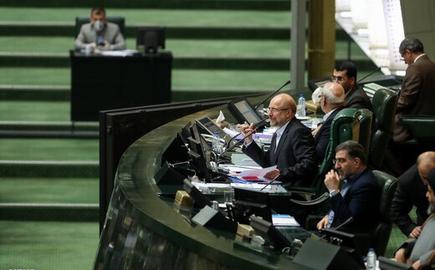Iran has threatened to block the International Atomic Energy Agency from monitoring the country’s nuclear program, a direct contravention of its commitments to the Nuclear Non-Proliferation Treaty.
Ahmadi Amiri Farahani, an influential member of Iran’s parliament, has said that if the US does not lift sanctions, especially those pertaining to the oil trade and financial transactions, during the first month of Joe Biden's presidency, the Islamic Republic will "definitely" expel International Atomic Energy Agency (IAEA) inspectors from the country.
According to a new law passed by parliament and approved by the Guardian Council, the government must suspend the implementation of the Additional Protocol, the section of the IAEA Nuclear Non-Proliferation Treaty (NPT) that allows the agency to verify Iran is using its nuclear material in a peaceful manner, before the end of the Iranian year [March 2021], unless European countries buy Iranian oil and pay for it through normal banking transactions. But in order for these countries to purchase oil from Iran, US sanctions must be lifted.
Hassan Rouhani's government was critical of the law and called on parliament to wait and allow the government, which Rouhani described as having "experience" in diplomacy, a chance to urge the Biden administration to lift the sanctions. Until now, it was assumed that the parliament had independently forced the government to suspend the implementation of the Additional Protocol, but with Ayatollah Ali Khamenei's defense of the new law, it became clear that there was a possibility of suspending its implementation and the expulsion of IAEA inspectors from Iran is now a real possibility.
IAEA agents carried out inspections in Iran as part of a bilateral agreement between the Islamic Republic and the IAEA that was signed at the same time as the nuclear deal, the Joint Comprehensive Plan of Action (JCPOA), increasing IAEA costs by about $6 million a year. The number of inspectors who have come to Iran remains confidential in accordance with the details of the agreement.
Under the agreement, the IAEA is entitled to carry out inspections in Iran on an ongoing basis as part of the implementation of the Additional Protocol. Inspectors can inspect Iran's nuclear facilities with immediate effect without informing the government. In addition, if they suspect uranium production or activity at a non-nuclear facility, they can demand the Iranian government allow environmental sampling from the site to determine the presence or absence of nuclear activity.
The Additional Protocol was established after Iraq began producing nuclear weapons on its secret nuclear sites during the era of Saddam Hussein. The Additional Protocol entitled inspectors to examine potential secret nuclear sites.
Due to the increasing presence of inspectors in Iran and the implementation of the Additional Protocol, world powers have so far not expressed too much worry about the twelve-fold increase in Iran's uranium reserves and the suspension of members of the IAEA Board. If Iran decides to abandon the implementation of the protocol and expel the inspectors who carry it out, it means the IAEA, and consequently the international community, will not be in a position to establish what is happening in Iran, or be aware of any secret nuclear activity.
Previously, the Islamic Republic had abandoned the implementation of this protocol in the early 2000s, prompting unprecedented pressure and extensive international sanctions.
At this point, there have been no concrete signs that members of parliament will suspend the implementation of the Additional Protocol. At the same time, however, parliament did establish a deadline for this process, and time is running out.
In his last days in office, US Secretary of State Mike Pompeo issued a press statement calling Iran's threat to expel the inspectors an example of Iran “using its nuclear program to extort the international community and threaten regional security”.
“Iran’s threat goes much further than violating the JCPOA,” the statement continued. “Iran has a legal treaty obligation to allow IAEA inspector access pursuant to Iran’s NPT-required safeguards agreement. Violating those obligations would thus go beyond Iran’s past actions inconsistent with its JCPOA nuclear commitments.”
Iran has not ratified the implementation of this protocol in parliament, and officials further say that it has no legal obligation to implement it and has simply accepted it "voluntarily" as part of the JCPOA to lift sanctions. But according to the JCPOA, Iran is obliged to submit this protocol to the parliament for approval; it must become binding to prompt the permanent lifting of US sanctions. If it does not do so, it is not legally obliged to implement it. Foreign minister Javad Zarif had suggested some time ago that if the United States lifted sanctions, Iran would send the bill to parliament to join the protocol ahead of schedule.
Contrary to what the Islamic Republic claims and assumes about the Additional Protocol, through the implementation of key parts of it, years have been added to the IAEA’s planned procedures. The abandonment of the protocol will not restrict the IAEA inspectors. But if Iran plans to abandon parts of the monitoring functions — that is, its permanent agreement with the IAEA — then what Pompeo says is true.
As a result, this will mean that the formal abandonment of the monitoring functions of the Additional Protocol will not merely be a violation of the JCPOA. Rather, it is a violation of the agreement with the IAEA, and it will mean the immediate return of the Islamic Republic to its previous state of crisis back in 2013 before nuclear negotiations got underway. It will amount to a nuclear, economic and diplomatic crisis of dramatic proportions.
Related coverage:
What are the Consequences of Iran’s Higher Rate of Uranium Enrichment?
visit the accountability section
In this section of Iran Wire, you can contact the officials and launch your campaign for various problems



























comments